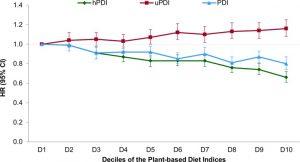A major study has provided critical insights into the relationship between plant-based dietary patterns and the risk of developing Type 2 diabetes (T2D). The research involved more than 200,000 participants from three large prospective cohort studies, assessing the impact of both healthful and unhealthful plant-based diets on the incidence of T2D.
Further Reading: Impacts of diet choice on your immune system
The study categorized plant-based diets into two types: a healthy plant-based diet, rich in whole grains, fruits, vegetables, and legumes, and an unhealthy plant-based diet, which included refined grains, sugary beverages, and processed plant products. The findings revealed a significant reduction in T2D risk among individuals who adhered to the healthy plant-based diet. In contrast, those following the unhealthful plant-based diet were at an increased risk of developing T2D.

Figure: Fig 1. Pooled hazard ratios (95% CIs) for type 2 diabetes according to deciles of the overall, healthful, and unhealthful plant-based diet indices. Results were pooled across the three cohorts using a fixed-effects model. Adjusted for age (years), smoking status (never, past, current [1–14, 15–24, or ≥25 cigarettes/day]), physical activity (<3, 3–8.9, 9–17.9, 18–26.9, or ≥27 MET-h/wk), alcohol intake (0, 0.1–4.9, 5–9.9, 10–14.9, or ≥15 g/d), multivitamin use (yes or no), family history of diabetes (yes or no), margarine intake (quintiles), energy intake (quintiles), baseline hypertension (yes or no), baseline hypercholesterolemia (yes or no), and BMI (<21, 21–22.9, 23–24.9, 25–26.9, 27–29.9, 30–32.9, 33–34.9, 35–39.9, or ≥40 kg/m2). Also adjusted for menopausal status and postmenopausal hormone use in NHS and NHS2 (premenopausal or, if postmenopausal, current, past, or never postmenopausal hormone use) and for oral contraceptive use in NHS2 (never, past, or current use). p trend < 0.001 for all indices. p-Value obtained by assigning the median value to each decile and entering this as a continuous variable in the model.
The study’s results are particularly relevant in light of current dietary recommendations, which encourage a shift towards plant-based eating to improve metabolic health. However, the researchers emphasized that not all plant-based diets are equally beneficial. Diets that emphasize whole, nutrient-dense plant foods are far more effective in reducing diabetes risk than those that include processed and sugary plant-based products.
This research supports the growing consensus that plant-based diets, when focused on high-quality foods, can play a key role in preventing chronic diseases like Type 2 diabetes. The findings highlight the importance of dietary quality in managing diabetes risk and provide strong evidence for the promotion of healthy plant-based eating patterns.
Summary by Faith Oluwamakinde










